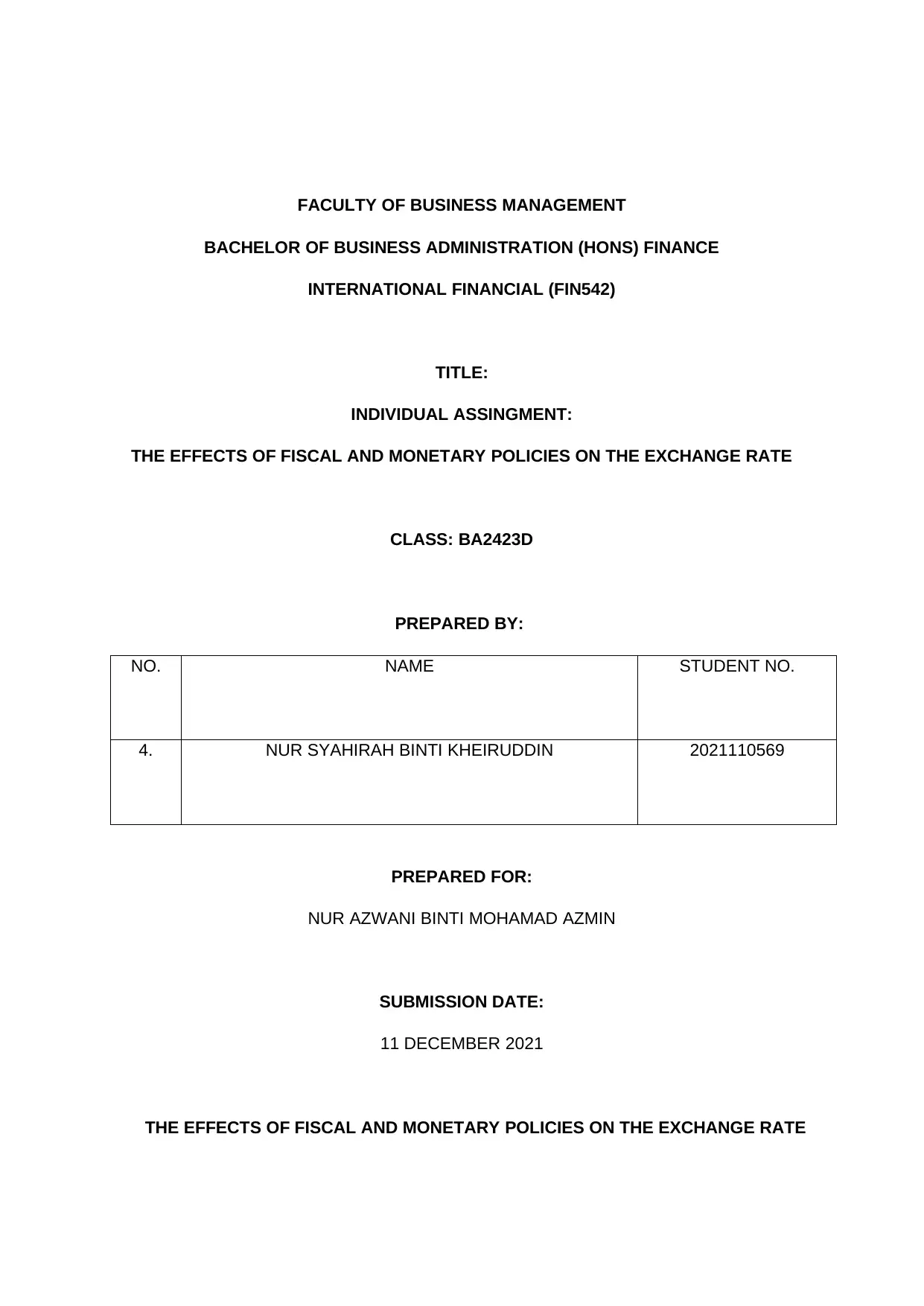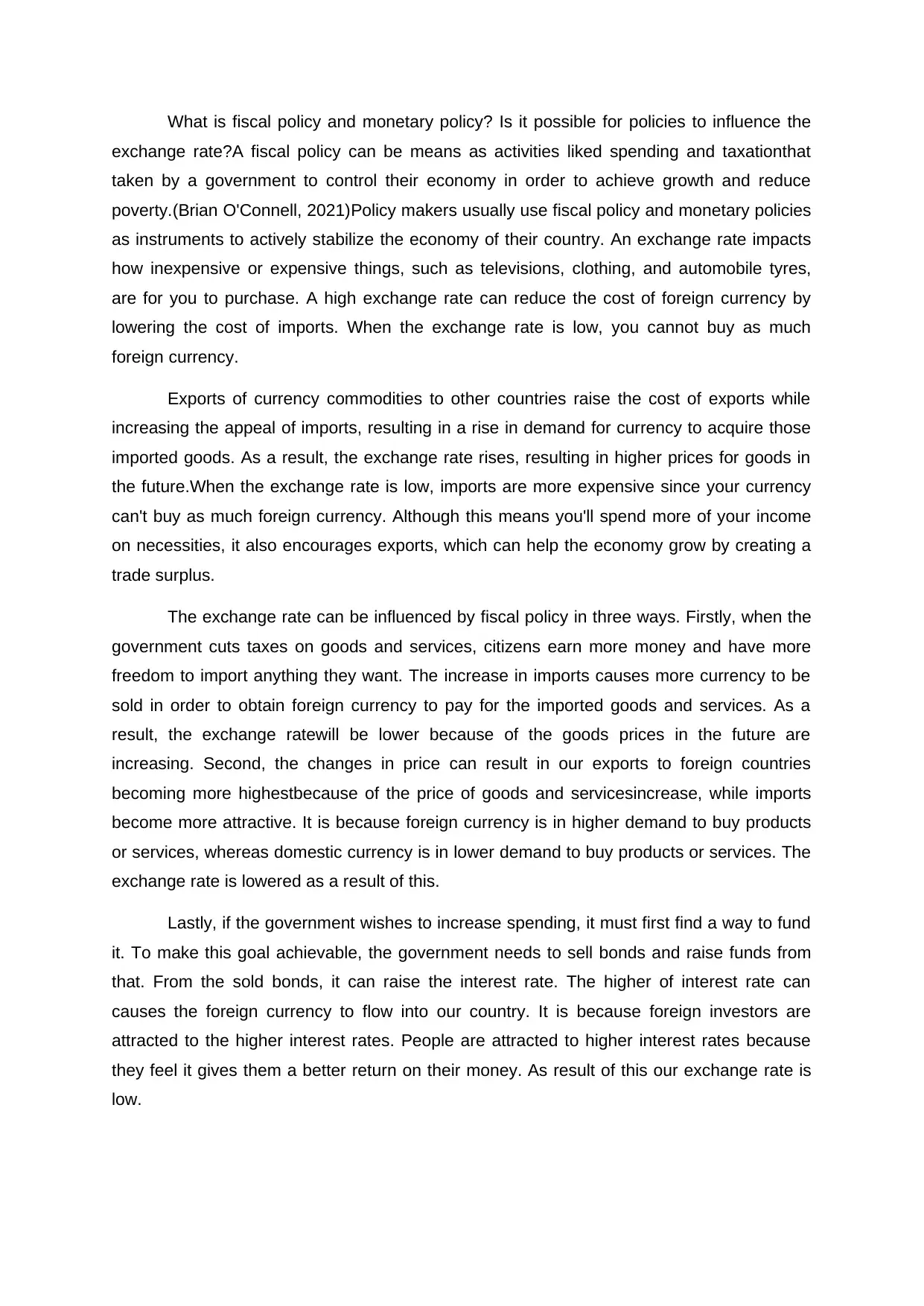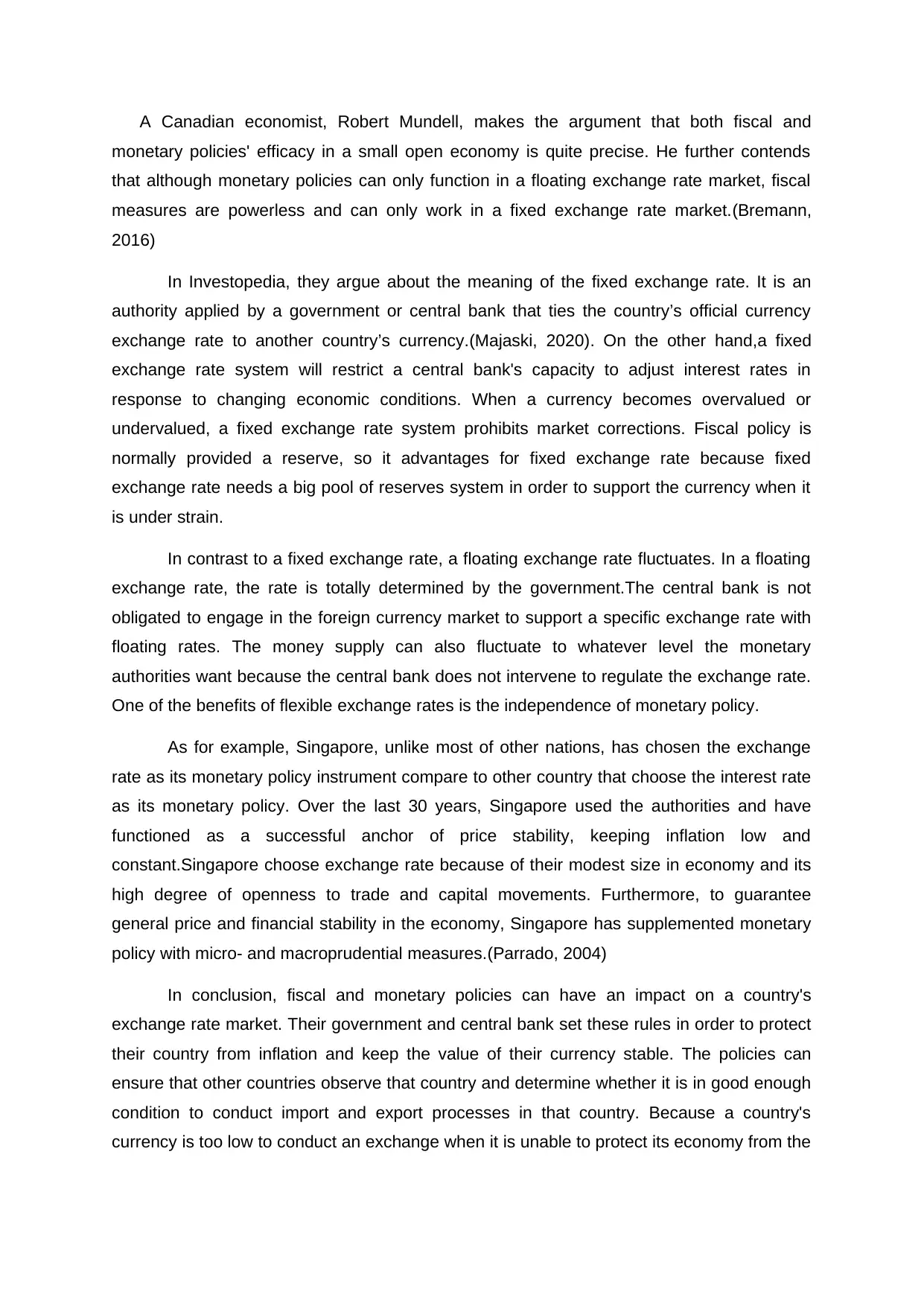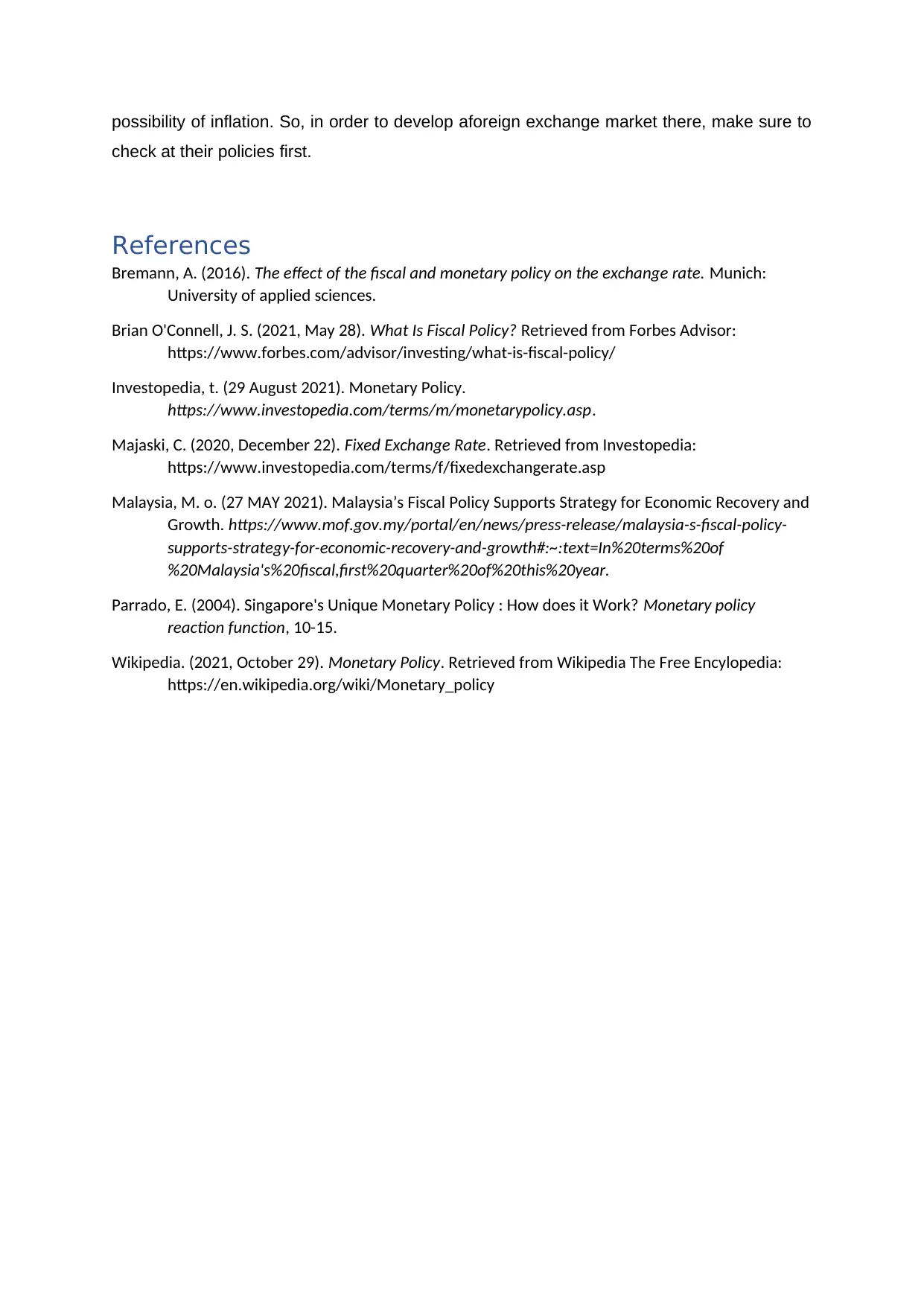Individual Assignment: Fiscal & Monetary Policies and Exchange Rate
VerifiedAdded on 2022/07/21
|4
|1284
|37
Homework Assignment
AI Summary
This individual assignment for the Bachelor of Business Administration (Hons) Finance course (FIN542) explores the effects of fiscal and monetary policies on exchange rates. It begins by defining fiscal and monetary policies and their roles in influencing a country's economy. The assignment then delves into how these policies affect the exchange rate through mechanisms such as changes in taxation, government spending, and interest rates. It discusses the impact of increased imports due to tax cuts, changes in prices on exports and imports, and the effect of government bond sales and interest rate hikes. The assignment also contrasts fixed and floating exchange rate systems, highlighting the limitations of monetary policy in a fixed exchange rate environment and the benefits of monetary policy independence in a floating exchange rate system. The conclusion emphasizes the importance of these policies in maintaining a stable currency and attracting foreign investment. The document includes references to support the arguments and findings.

FACULTY OF BUSINESS MANAGEMENT
BACHELOR OF BUSINESS ADMINISTRATION (HONS) FINANCE
INTERNATIONAL FINANCIAL (FIN542)
TITLE:
INDIVIDUAL ASSINGMENT:
THE EFFECTS OF FISCAL AND MONETARY POLICIES ON THE EXCHANGE RATE
CLASS: BA2423D
PREPARED BY:
NO. NAME STUDENT NO.
4. NUR SYAHIRAH BINTI KHEIRUDDIN 2021110569
PREPARED FOR:
NUR AZWANI BINTI MOHAMAD AZMIN
SUBMISSION DATE:
11 DECEMBER 2021
THE EFFECTS OF FISCAL AND MONETARY POLICIES ON THE EXCHANGE RATE
BACHELOR OF BUSINESS ADMINISTRATION (HONS) FINANCE
INTERNATIONAL FINANCIAL (FIN542)
TITLE:
INDIVIDUAL ASSINGMENT:
THE EFFECTS OF FISCAL AND MONETARY POLICIES ON THE EXCHANGE RATE
CLASS: BA2423D
PREPARED BY:
NO. NAME STUDENT NO.
4. NUR SYAHIRAH BINTI KHEIRUDDIN 2021110569
PREPARED FOR:
NUR AZWANI BINTI MOHAMAD AZMIN
SUBMISSION DATE:
11 DECEMBER 2021
THE EFFECTS OF FISCAL AND MONETARY POLICIES ON THE EXCHANGE RATE
Paraphrase This Document
Need a fresh take? Get an instant paraphrase of this document with our AI Paraphraser

What is fiscal policy and monetary policy? Is it possible for policies to influence the
exchange rate?A fiscal policy can be means as activities liked spending and taxationthat
taken by a government to control their economy in order to achieve growth and reduce
poverty.(Brian O'Connell, 2021)Policy makers usually use fiscal policy and monetary policies
as instruments to actively stabilize the economy of their country. An exchange rate impacts
how inexpensive or expensive things, such as televisions, clothing, and automobile tyres,
are for you to purchase. A high exchange rate can reduce the cost of foreign currency by
lowering the cost of imports. When the exchange rate is low, you cannot buy as much
foreign currency.
Exports of currency commodities to other countries raise the cost of exports while
increasing the appeal of imports, resulting in a rise in demand for currency to acquire those
imported goods. As a result, the exchange rate rises, resulting in higher prices for goods in
the future.When the exchange rate is low, imports are more expensive since your currency
can't buy as much foreign currency. Although this means you'll spend more of your income
on necessities, it also encourages exports, which can help the economy grow by creating a
trade surplus.
The exchange rate can be influenced by fiscal policy in three ways. Firstly, when the
government cuts taxes on goods and services, citizens earn more money and have more
freedom to import anything they want. The increase in imports causes more currency to be
sold in order to obtain foreign currency to pay for the imported goods and services. As a
result, the exchange ratewill be lower because of the goods prices in the future are
increasing. Second, the changes in price can result in our exports to foreign countries
becoming more highestbecause of the price of goods and servicesincrease, while imports
become more attractive. It is because foreign currency is in higher demand to buy products
or services, whereas domestic currency is in lower demand to buy products or services. The
exchange rate is lowered as a result of this.
Lastly, if the government wishes to increase spending, it must first find a way to fund
it. To make this goal achievable, the government needs to sell bonds and raise funds from
that. From the sold bonds, it can raise the interest rate. The higher of interest rate can
causes the foreign currency to flow into our country. It is because foreign investors are
attracted to the higher interest rates. People are attracted to higher interest rates because
they feel it gives them a better return on their money. As result of this our exchange rate is
low.
exchange rate?A fiscal policy can be means as activities liked spending and taxationthat
taken by a government to control their economy in order to achieve growth and reduce
poverty.(Brian O'Connell, 2021)Policy makers usually use fiscal policy and monetary policies
as instruments to actively stabilize the economy of their country. An exchange rate impacts
how inexpensive or expensive things, such as televisions, clothing, and automobile tyres,
are for you to purchase. A high exchange rate can reduce the cost of foreign currency by
lowering the cost of imports. When the exchange rate is low, you cannot buy as much
foreign currency.
Exports of currency commodities to other countries raise the cost of exports while
increasing the appeal of imports, resulting in a rise in demand for currency to acquire those
imported goods. As a result, the exchange rate rises, resulting in higher prices for goods in
the future.When the exchange rate is low, imports are more expensive since your currency
can't buy as much foreign currency. Although this means you'll spend more of your income
on necessities, it also encourages exports, which can help the economy grow by creating a
trade surplus.
The exchange rate can be influenced by fiscal policy in three ways. Firstly, when the
government cuts taxes on goods and services, citizens earn more money and have more
freedom to import anything they want. The increase in imports causes more currency to be
sold in order to obtain foreign currency to pay for the imported goods and services. As a
result, the exchange ratewill be lower because of the goods prices in the future are
increasing. Second, the changes in price can result in our exports to foreign countries
becoming more highestbecause of the price of goods and servicesincrease, while imports
become more attractive. It is because foreign currency is in higher demand to buy products
or services, whereas domestic currency is in lower demand to buy products or services. The
exchange rate is lowered as a result of this.
Lastly, if the government wishes to increase spending, it must first find a way to fund
it. To make this goal achievable, the government needs to sell bonds and raise funds from
that. From the sold bonds, it can raise the interest rate. The higher of interest rate can
causes the foreign currency to flow into our country. It is because foreign investors are
attracted to the higher interest rates. People are attracted to higher interest rates because
they feel it gives them a better return on their money. As result of this our exchange rate is
low.

A Canadian economist, Robert Mundell, makes the argument that both fiscal and
monetary policies' efficacy in a small open economy is quite precise. He further contends
that although monetary policies can only function in a floating exchange rate market, fiscal
measures are powerless and can only work in a fixed exchange rate market.(Bremann,
2016)
In Investopedia, they argue about the meaning of the fixed exchange rate. It is an
authority applied by a government or central bank that ties the country’s official currency
exchange rate to another country’s currency.(Majaski, 2020). On the other hand,a fixed
exchange rate system will restrict a central bank's capacity to adjust interest rates in
response to changing economic conditions. When a currency becomes overvalued or
undervalued, a fixed exchange rate system prohibits market corrections. Fiscal policy is
normally provided a reserve, so it advantages for fixed exchange rate because fixed
exchange rate needs a big pool of reserves system in order to support the currency when it
is under strain.
In contrast to a fixed exchange rate, a floating exchange rate fluctuates. In a floating
exchange rate, the rate is totally determined by the government.The central bank is not
obligated to engage in the foreign currency market to support a specific exchange rate with
floating rates. The money supply can also fluctuate to whatever level the monetary
authorities want because the central bank does not intervene to regulate the exchange rate.
One of the benefits of flexible exchange rates is the independence of monetary policy.
As for example, Singapore, unlike most of other nations, has chosen the exchange
rate as its monetary policy instrument compare to other country that choose the interest rate
as its monetary policy. Over the last 30 years, Singapore used the authorities and have
functioned as a successful anchor of price stability, keeping inflation low and
constant.Singapore choose exchange rate because of their modest size in economy and its
high degree of openness to trade and capital movements. Furthermore, to guarantee
general price and financial stability in the economy, Singapore has supplemented monetary
policy with micro- and macroprudential measures.(Parrado, 2004)
In conclusion, fiscal and monetary policies can have an impact on a country's
exchange rate market. Their government and central bank set these rules in order to protect
their country from inflation and keep the value of their currency stable. The policies can
ensure that other countries observe that country and determine whether it is in good enough
condition to conduct import and export processes in that country. Because a country's
currency is too low to conduct an exchange when it is unable to protect its economy from the
monetary policies' efficacy in a small open economy is quite precise. He further contends
that although monetary policies can only function in a floating exchange rate market, fiscal
measures are powerless and can only work in a fixed exchange rate market.(Bremann,
2016)
In Investopedia, they argue about the meaning of the fixed exchange rate. It is an
authority applied by a government or central bank that ties the country’s official currency
exchange rate to another country’s currency.(Majaski, 2020). On the other hand,a fixed
exchange rate system will restrict a central bank's capacity to adjust interest rates in
response to changing economic conditions. When a currency becomes overvalued or
undervalued, a fixed exchange rate system prohibits market corrections. Fiscal policy is
normally provided a reserve, so it advantages for fixed exchange rate because fixed
exchange rate needs a big pool of reserves system in order to support the currency when it
is under strain.
In contrast to a fixed exchange rate, a floating exchange rate fluctuates. In a floating
exchange rate, the rate is totally determined by the government.The central bank is not
obligated to engage in the foreign currency market to support a specific exchange rate with
floating rates. The money supply can also fluctuate to whatever level the monetary
authorities want because the central bank does not intervene to regulate the exchange rate.
One of the benefits of flexible exchange rates is the independence of monetary policy.
As for example, Singapore, unlike most of other nations, has chosen the exchange
rate as its monetary policy instrument compare to other country that choose the interest rate
as its monetary policy. Over the last 30 years, Singapore used the authorities and have
functioned as a successful anchor of price stability, keeping inflation low and
constant.Singapore choose exchange rate because of their modest size in economy and its
high degree of openness to trade and capital movements. Furthermore, to guarantee
general price and financial stability in the economy, Singapore has supplemented monetary
policy with micro- and macroprudential measures.(Parrado, 2004)
In conclusion, fiscal and monetary policies can have an impact on a country's
exchange rate market. Their government and central bank set these rules in order to protect
their country from inflation and keep the value of their currency stable. The policies can
ensure that other countries observe that country and determine whether it is in good enough
condition to conduct import and export processes in that country. Because a country's
currency is too low to conduct an exchange when it is unable to protect its economy from the
⊘ This is a preview!⊘
Do you want full access?
Subscribe today to unlock all pages.

Trusted by 1+ million students worldwide

possibility of inflation. So, in order to develop aforeign exchange market there, make sure to
check at their policies first.
References
Bremann, A. (2016). The effect of the fiscal and monetary policy on the exchange rate. Munich:
University of applied sciences.
Brian O'Connell, J. S. (2021, May 28). What Is Fiscal Policy? Retrieved from Forbes Advisor:
https://www.forbes.com/advisor/investing/what-is-fiscal-policy/
Investopedia, t. (29 August 2021). Monetary Policy.
https://www.investopedia.com/terms/m/monetarypolicy.asp.
Majaski, C. (2020, December 22). Fixed Exchange Rate. Retrieved from Investopedia:
https://www.investopedia.com/terms/f/fixedexchangerate.asp
Malaysia, M. o. (27 MAY 2021). Malaysia’s Fiscal Policy Supports Strategy for Economic Recovery and
Growth. https://www.mof.gov.my/portal/en/news/press-release/malaysia-s-fiscal-policy-
supports-strategy-for-economic-recovery-and-growth#:~:text=In%20terms%20of
%20Malaysia's%20fiscal,first%20quarter%20of%20this%20year.
Parrado, E. (2004). Singapore's Unique Monetary Policy : How does it Work? Monetary policy
reaction function, 10-15.
Wikipedia. (2021, October 29). Monetary Policy. Retrieved from Wikipedia The Free Encylopedia:
https://en.wikipedia.org/wiki/Monetary_policy
check at their policies first.
References
Bremann, A. (2016). The effect of the fiscal and monetary policy on the exchange rate. Munich:
University of applied sciences.
Brian O'Connell, J. S. (2021, May 28). What Is Fiscal Policy? Retrieved from Forbes Advisor:
https://www.forbes.com/advisor/investing/what-is-fiscal-policy/
Investopedia, t. (29 August 2021). Monetary Policy.
https://www.investopedia.com/terms/m/monetarypolicy.asp.
Majaski, C. (2020, December 22). Fixed Exchange Rate. Retrieved from Investopedia:
https://www.investopedia.com/terms/f/fixedexchangerate.asp
Malaysia, M. o. (27 MAY 2021). Malaysia’s Fiscal Policy Supports Strategy for Economic Recovery and
Growth. https://www.mof.gov.my/portal/en/news/press-release/malaysia-s-fiscal-policy-
supports-strategy-for-economic-recovery-and-growth#:~:text=In%20terms%20of
%20Malaysia's%20fiscal,first%20quarter%20of%20this%20year.
Parrado, E. (2004). Singapore's Unique Monetary Policy : How does it Work? Monetary policy
reaction function, 10-15.
Wikipedia. (2021, October 29). Monetary Policy. Retrieved from Wikipedia The Free Encylopedia:
https://en.wikipedia.org/wiki/Monetary_policy
1 out of 4
Related Documents
Your All-in-One AI-Powered Toolkit for Academic Success.
+13062052269
info@desklib.com
Available 24*7 on WhatsApp / Email
![[object Object]](/_next/static/media/star-bottom.7253800d.svg)
Unlock your academic potential
Copyright © 2020–2025 A2Z Services. All Rights Reserved. Developed and managed by ZUCOL.




